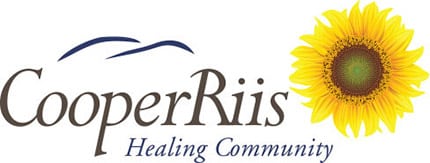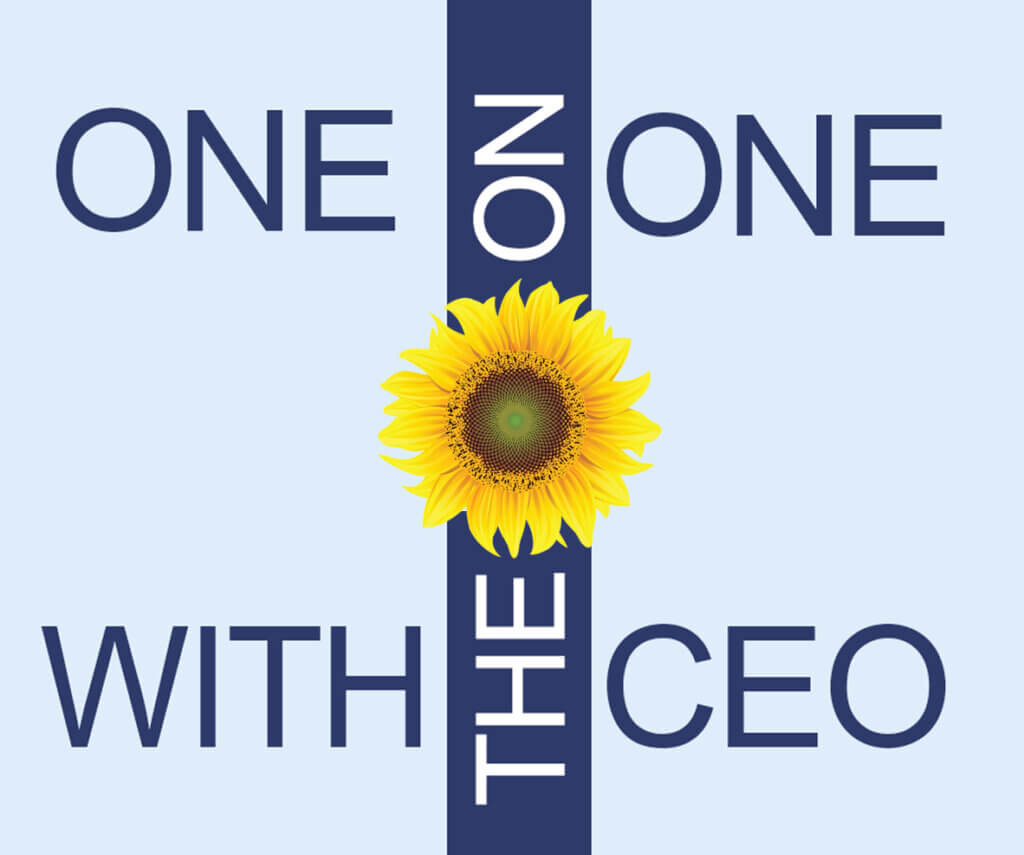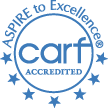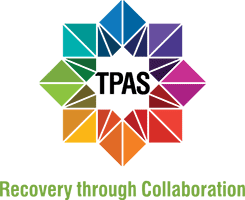
In honor of World Mental Health Day in early October we hosted an important conversation with our Chief Clinical Officer, Johnnie Featherston, MA, LCMHC. The focus was on mental health as a basic human right. We hope you enjoy the series, “ONE on ONE with the CEO.” Be sure to subscribe to our YouTube channel so you don’t miss any of them.
“…even though I lived in abject poverty, I decided, I am not the project. You know? I am not this person and I’m not the daughter of a man who had problems with alcoholism... I had dreams and goals, and I put on blinders basically, and then I just focused, I kept focusing…my goal was to leave, to get out of there, because I didn’t want to become another statistic…”
Wendy Reed Randall
Author/LCAS
Read the entire transcript below:
[ERIC] Hey, thank you so much, Wendy. Now I’m shifting into bad interviewer, because I’m not a professional interviewer. I’m the CEO here at CooperRiis and I don’t know if you had a chance to dig in a little bit about who we are…
[WENDY] I did a little bit. I did.
[ERIC] …and I’m obviously very intrigued and impressed and flattered that you would take the time to talk with me about your work, and I’m always interested in the intersection of what people do and what CooperRiis is about, and I see that you’re an addiction specialist, licensed addictions person and…
[WENDY] Yes, that’s the job that I had. Yes, that is correct.
[ERIC] We know that there’s a relationship, and it’s interesting, I always want to understand it- between addictions and mental health- they don’t live in silos, and sometimes they live together, and sometimes addictions can be what’s in front of really unmasking a serious mental health challenge. Sometimes it’s going to be a function of somebody trying to manage a mental health crisis. So, I’m interested in that. And whoever comes in and watches this interview should walk away with a better understanding of who you are and what you do and know about your book, ‘Once There Was A Girl’, your memoir. I’m real interested, obviously cause I’m in this world, but I also have family in Louisiana. I’ve got a strong connection there. So obviously it gets my attention. Can you tell me about you… less about me…what about you?
Growing Up in The Projects of New Orleans
[WENDY] Okay, so I grew up in New Orleans in the now defunct housing projects…it was called the Florida housing projects, but it was in New Orleans. And I spent my formidable years there. My mother and father were in the home for most of my life. Initially, it was my mother, and then my father came back into our lives. My mother raised us and, you know, did the best that she could. She was a beautiful person. She’s now deceased. My father’s also deceased, but when my father came back into our lives- he had been away from us- they were separated because he was an alcoholic. He had significant problems with alcohol. And so my mother made the decision to leave him. So subsequently she ended up being a single mom, raising three daughters. And she was in the Florida housing projects. And then when my father came back into our lives, he came back clean and sober. My mother said that he could not come back into our lives until he had stopped drinking. So, he came back clean and sober. And so, from that period of time, he never took another drink. I don’t know what kind of programs he went to or anything like that. I mean, that was basically from the perspective of a child, when he came back into our lives, my mother had told us that he had to come back clean and sober, and even though I was a little kid, I knew what that… I knew, she had told me so many stories. And so, we already knew about his history. So, when he came back, we didn’t worry about it.
I just think about that sometimes, like how sometimes when people are in the recovery process, a lot of times the family members are so worried that they’re going to relapse. Well, for some reason, I don’t know if my mother worried, but I didn’t worry and I never worried and he never took another drink.
He was, however, addicted to tobacco. I mean, he smoked cigarettes, you know, but he never… we never had alcohol in our home from that time. When he came back a clean and sober man, we never had alcohol. Now, he had other challenges. So, we lived in the housing projects for many, many years, and I went through high school in the projects, I went through four years of college in the projects. I share all of that in my story. The French language and culture play a role in my story. A significant role, you know? French is the official language of Louisiana.
[ERIC] Right… French or Cajun French? What’s the, the dialect?
[WENDY] Cajun and Creole. So, I have… when I went to high school many years ago, it was required that we take a foreign language, and many of the people in my high school chose French because {ed: of that}, and so I chose French. And my interaction with the language initially was, you know, your stereotypical thing …like something you have to do, but then something happened when I was in my senior year that forever changed my life. And I share that in my story, where the French language and culture play a significant role.
I got the opportunity to- by the grace and mercy of God- to travel to France, to Paris and parts of France while still living in the projects…if you can imagine, it’s like a big…it’s an opportunity, a bipolar type of thing… that’s not the best word, but it’s very… you can only imagine if you live in the projects and outside of your window, you see people using drugs and all of those things, and then miraculously you get the opportunity for just a brief moment in your life to go to the opposite side, to another part of the world and to live in a whole different environment while I’m still thinking that I live in the projects. And my father plays a significant role. You know, he… even though he only had an 8th grade education, he read every day. He read the newspaper every day. My mother had a high school diploma, but they were both readers. So, they promoted the love of reading. I think that my father sort of lived vicariously through us. I believe he did. I believe that my two sisters and I represented some of the things that he wished that he had been able to do.
And so, when he played that huge role in helping me go to France, while we still lived in the projects, I think that in that moment in time, he just connected with a dream that I had, you know, because we all have our dreams and he had… I’m sure he had unfulfilled dreams. You know, and I think that played a significant role.
“…you should wake up every day with hope. And even if you, no matter what’s going on in your life, whatever difficulties you’re facing, if you could just wake up with a measure of hope. If you could just think of one small thing that you’re thankful for and something that you believe will happen to you… that helps us in the healing process.”
Wendy Reed Randall
Author/LCAS
[ERIC] No, absolutely. Can you talk a little bit about hope and healing? You know, because that’s what CooperRiis is really all about. We’re a recovery model that serves adults with mental health challenges. Most of the people that come through here, at some point, have had addiction issues, but we’re not an addictions program.
We’re not a dual diagnosis program. We’re a primary mental health program, but the core that runs its way through all our programs is really about hope and healing. And that to me is, you know…
[WENDY] You said hope, hope and healing, right?
[ERIC] Hope and healing. Yeah. Talk a little bit about that if you will, because that’s, that’s what we’re all about here.
[WENDY] Sure. I think that one thing I share with people is that you should wake up every day with hope. And even if you, no matter what’s going on in your life, whatever difficulties you’re facing, if you could just wake up with a measure of hope. If you could just think of one small thing that you’re thankful for and something that you believe will happen to you, because that helps us in the healing process.
It’s when we feel like we’re stuck, and nothing will change. And when we choose, we wake up every day and we don’t want to wake up. We don’t want to get out of bed. We don’t want to do anything. We feel that our dreams and goals…we will never achieve them. And so, we might as well stay where we are, which for many people would be to remain in your addiction and to choose to not make any… to choose to not do better.
But I think it’s very important from the first time you wake up. And for me, from a Christian perspective, you know, I wake up and I pray, and that’s how I get centered- I read the Bible and those things help me, you know, but for each person… we all have dreams and goals. If you can think about when you were a child, when you were a little kid, and you thought you could be anything in the world. But then life happens, and we forget about those things… we forget about those dreams and goals, and we feel like we’ll never achieve them. But I think if you can just come to a point in your life where, when you wake up in the morning, even if it’s just a little bit of hope, like ‘I hope that I can make that call today’, for example, you know, ‘I hope that I can just start on my resume. I hope that I can at least figure out how to get it started’. Or, ‘I hope that I can call a loved one and just say, “hello, how you’re doing?”’, …maybe ‘I hope that I can reach out to that person who has issues with me’, or ‘I hope that I can make it to a meeting…I plan to do that’. You know, ‘I’m aspiring to do that’. And of course, also, when you go to bed at night… thinking about the next day with the hope of doing things the next day, not just living life without a purpose, without focus.
[ERIC] Sometimes it’s as simple as hoping you can get up and just make your bed. If that’s all you do…
[WENDY] That’s it.
[ERIC] You’ve heard that one before. If you do nothing else…
[WENDY] Yes. Make your bed.
“…regardless of your circumstances, if you’re able to give back, be productive, contribute, be a citizen, and be a part of something bigger than yourself, those are the elements that promote recovery…”
Eric Levine
President/CEO
Missionary Work in Mexico
[ERIC] Let me follow up a little bit. You’re unique in that you’ve got this incredible world experience juxtaposed against pretty tough beginnings, and so I suspect that you’ve met some pretty amazing people who have been able to demonstrate incredible resilience and perseverance against all sorts of odds internationally. And if you look back on your travels and all the places you’ve been, and the people… this is a tough question… the people that you’ve met- if you were going to tease out the qualities or what you’ve seen common to the folks that have been able to overcome their mental health challenges or their serious addiction experiences, what are you seeing out there in the world that maybe I could walk away from and say, ‘you know what, we need to consider this in our programming’?
[WENDY] I’m seeing people who do not let their circumstances define them. I have noticed that they’re joyful. You know? They have an inner peace that seems to just resonate.
For example, when we were in Mexico, there was a woman with whom I became friends. I didn’t know her living situation until I got up close and personal. We would go…we were making sandwiches and bringing bottles of water to the people who were working in the dump and living around the dump. We were doing that twice a week. This particular person- she was helping with making the sandwiches and everything- and just by her attire and her demeanor, the joy that she had- like she was so joyful…I just made this assumption that she was living, you know, I didn’t think she was rich or anything, but I felt like she had a house and everything, and she was living just fine.
Long story short, she was living in abject poverty. …it just makes me want to tear up… she was there serving other people, you know, wrap your mind around that… this person, who we all subsequently, my husband and I, tried to help her as much as we could to pull her up a little bit…but she still had joy. She was just joyful. And she was determined to come and make those sandwiches when she actually had the need herself. She needed the sandwiches herself. She needed the water herself. I went to visit her at her humble home, and I sat on a bed in the dark because, you know, she didn’t have electricity running in there. Her bathroom, so to speak, was on the outside. Her toilet was external to the building, and it was an old looking something. It was just…it needed help. And so, this woman was going to help other people, you see, and she would give of her time, and all of that. And the job that she did was cleaning houses, basically.
[ERIC] So, what you’re saying…what I’m hearing you say is regardless of your circumstances, if you’re able to give back, be productive, contribute, be a citizen, and be a part of something bigger than yourself, those are the elements that promote recovery, and that really does tie into… we have a community work and service program here that… people come to our farm program and they work with the animals. They work in the greenhouses. They do things to help make the campus beautiful. And that combined with the other elements of our program, we believe really- certainly not living in a dump and making food for people- but if you really pull the lens back, there’s some similarities.
[WENDY] Indeed. Indeed. Yeah, that was something that helped. I mean, growing up in New Orleans how I did, you know, that was key for us to not be defined by our circumstances. Most people who met us externally from the projects, many people didn’t know- they had no idea, because even though I lived in abject poverty, I decided, I am not the project. You know? I am not this person and I’m not the daughter of a man who had problems with alcoholism. I know that the history and the family issues that happen when your parents…all those things that we talk about. But I remember… I never felt like I would become an alcoholic. I never thought about that. I never used drugs. I could have had any drug. I could have had anything. I mean, it was being sold right in the building. They were out there. They were doing the thing. I mean, as a young woman, you know how the thing goes…people would give it to you. I had dreams and goals, and I put on blinders basically, and then I just focused, I kept focusing…my goal was to leave, to get out of there, because I didn’t want to become another statistic, you know, in each passing year, I felt the chances of becoming another statistic would be getting greater and greater, because you never know what you’d be introduced to, and you might just, in a moment of weakness, give in.
[ERIC] It’s incredible because a lot of people don’t have that baked into their soul, especially when they’re surrounded by such difficult circumstances. You talked about dreams and having dreams. And that again, I’m going to weave that back to CooperRiis. That’s one of the first things we do with somebody when they get to one of our programs- we ask them to develop a dream statement, which really is the anchor of their recovery experience.
[WENDY] That’s great.
[ERIC] I can talk to you for a long time, but- we can’t. Your memoir is ‘Once There Was A Girl’, and where can you find it?
[WENDY] It’s on Amazon. It’s at Walmart. Its wherever books are. So, it could be in some libraries if it’s been picked up…and also it is on Audible. It’s an audio book. If you have Audible, you can {ed: listen}. I narrate my own story. I’m trying to promote that more- it hasn’t been promoted as much. And then, of course, the English version, ‘Once There Was a Girl, A Memoir’. And then the Spanish version would be ‘Habia Una Vez Una Niña, Una Memoria’.
[ERIC] Yo entiendo {ed: I understand}…
[WENDY] Que bueno. {ed: very good}
[ERIC] Well, this is wonderful. I have Audible. I’m going to get it. I want to listen to it. I’m thrilled that you were willing to spend a few minutes with me and best of luck… maybe our paths will cross again.
[WENDY] Yes, indeed. Well, thank you so much. It’s a pleasure meeting you.
[ERIC] Okay. If you’re ever in the States and you want to come by and sit down with groups of people, let me know. I’d love to have you.
[WENDY] Oh sure! That’s another thing. I mean, I’m working at doing more motivational speaking. So that’s my path in addition to sharing my book, but I also want to share my story in an up close and personal way. So, I’m networking with certain people to do that in New Orleans. I will be doing things and I’m trying to do stuff with schools also. So that’s another piece of me, where I’m an educator also. So, I’m trying to do things…
[ERIC] …me too, by the way…
[WENDY] Cool. So, my goal is to use my books to promote reading and literacy and the other things that we talked about.
[ERIC] Yeah. All right. Well, get in touch when you’re back. It’s only a 10-and-a-half-hour drive from New Orleans to Asheville and it would be great.
[WENDY] Okay, great.
[ERIC] Well, thank you so much.










